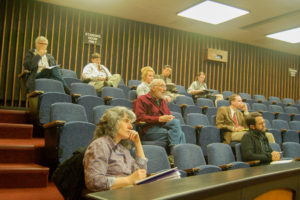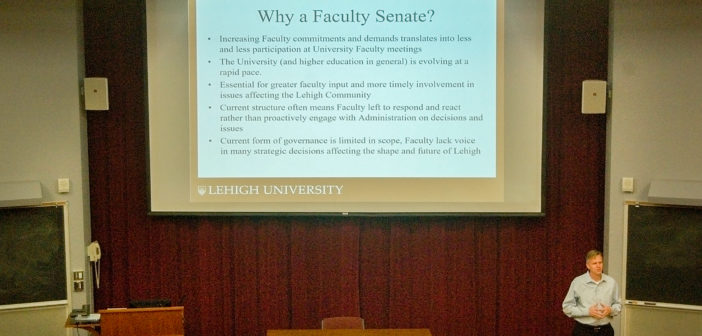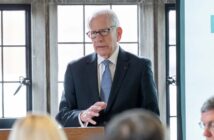The proposed Faculty Senate is entering its next stages of development after holding its first town hall meeting on Wednesday, April 19 and a second on Tuesday, April 25 at Mountaintop Campus.
The purpose of the Faculty Senate is to establish a voice representative of Lehigh’s colleges, where the chairman of the senate represents the will of the faculty at administrative meetings or meetings with the board of trustees.
The proposed Senate will be composed of no more than 49 members, which represents 8 percent of the faculty. The faculty senators will be elected by their respective schools and will hold their positions as senators for two years.
The senators from each school will be proportionate to the amount of faculty in each college. Arts and sciences will have 21 senators, engineering will have 12, business will have seven and education will have three.
Douglas Mahony, associate professor of management and the chair of the Faculty Governance and Engagement Committee, said the goals of the town halls are twofold.
One is to make sure the details of the Faculty Senate are communicated to as many professors as possible. Then, they wish to collect as much feedback and comments as necessary on the Faculty Senate proposal to get an idea as to what the faculty thinks of the issue.

Professors from different departments attend the Faculty Senate town hall meeting Wednesday, April 19, 2017, in Sinclair Auditorium. The town hall meeting was held to discuss the Faculty Senate proposal. (Mudassir Kadri/B&W Staff)
At the first town hall meeting, faculty attendance was low. However, the attendees gave substantial feedback about the proposal.
“The questions were very good, I had just wished there were more people,” said Frank Gunter, an economics professor and member of the faculty governance committee. “We’re stuck because this is the busiest part of the semester for the faculty.”
Anne Anderson, an associate finance professor and a committee member, said she was also disappointed with the attendance at the April 19 town hall. Anderson suggested another meeting should be hosted in the fall because it’s a less hectic time for faculty members.
Minimal attendance at faculty meetings like the town hall is precisely what the Faculty Senate aims to fix.
“By having a representative body with members elected by their respective college, ideally (the Senate) will have a more representative composition relative to just the few who go to faculty meetings currently,” Mahony said.
Mahony began the meeting by presenting the goals of the Faculty Senate, the structure of the Senate and the future steps that will be taken toward the creation of the Senate.
The floor was then opened up to the faculty to questions and comments on the proposal.
One of the major points discussed at the town hall were the duties of the faculty senators. These duties include attending all Senate meetings and facilitating continuous communication between the Senate and the senator’s respective college.
Another topic of discussion was the number of years a professor of practice would need to have in order to become a senator. The attendees discussed whether they should have a minimum of three or five years of experience, if professors of practice are eligible for election and whether or not eligibility for the Faculty Senate should be included in contracts for professors of practice.
The town halls are also open to students. The Faculty Senate plans on having the presidents of the Student Senate and the Graduate Student Senate sit in as ex officio members of the Senate.
“Our expectation is that they will represent the student views,” Anderson said. “Then the student senators will go back and speak with their constituents so that there is a flow of communication.”
After Tuesday’s town hall, the next step for the Senate will be to refine the proposal until a consensus is reached.
“The end document has to fix the government’s problems and has to be something that is passed by the faculty and passed by the board,” Anderson said. “Part of the challenge is you can’t make everyone happy so you’ve got to find the balance.”
The refined proposal will be read and discussed at two faculty meetings in the fall. Then the faculty will vote on whether or not they would like to see a Faculty Senate implemented.
The adjusted proposal will be presented to the board of trustees in the fall. If approved, the Faculty Senate will begin meeting in the first university faculty meeting following the board of trustees’ approval.
“Will the senate succeed?” Gunter said. “I think it comes down to who is elected. If the senate elects a George Washington, we will succeed. If we elect a Richard Nixon, we won’t succeed. It depends on if each college elects really good senators and if the senate elects a really good chairperson.”





Comment policy
Comments posted to The Brown and White website are reviewed by a moderator before being approved. Incendiary speech or harassing language, including comments targeted at individuals, may be deemed unacceptable and not published. Spam and other soliciting will also be declined.
The Brown and White also reserves the right to not publish entirely anonymous comments.
1 Comment
Tricky Dick did fairly well on foreign policy not so much so on getting re-elected. George had problems with military actions but was steadfast.